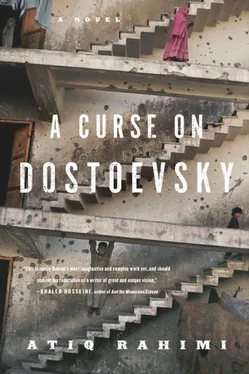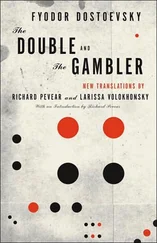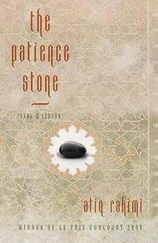All bodies need ether.
Need hemp, now and forever.
There is no one in the saqi-khana except Mustapha, curled up in a corner next to an unlit chillum. Rassoul greets him: “Salam!” Mustapha sits up drowsily, nods his head in response, and asks, as if in homage to his friend Jalal: “Has the war begun?” “No,” says Rassoul. Mustapha invites him to sit down. “Do you have a tali of hashish?”
“I wouldn’t have come if I did.”
Mustapha struggles to his feet and staggers over to the far end of the den, saying, “When Kaka Sarwar died, everyone left…”
“He died?”
“Yes, they killed him. One day, when he was really flying, he went to the mosque, strode up to the pulpit, seized the loudspeaker, and recited verse 18 from the Koran. You know, the one he was always quoting, the story of Gog and Magog.” Mustapha prizes a loose brick from the wall and continues. “We were here. We could hear him. We heard the shots they fired at him.” He rummages around in the hole and then with a stifled groan pulls out a scorpion by the tail. He drops it into the chillum. “This is all we have left to smoke,” he sniggers sadly. He strikes a match and sets fire to the creature. Eyes closed, he inhales the smoke and holds it in his lungs for a long time. Then he passes the chillum to Rassoul, and curls back up in his corner. Rassoul takes a brief, hesitant drag, then another longer one. It burns as if he had swallowed both the scorpion and its venom. His throat seizes up. His veins pulse like small, injured serpents trying to surge out of his skin. He drops the chillum, leans against the wall, and pushes himself to his feet. The room is spinning. Everything goes black. The door is only two steps away, but it takes forever to reach.
Outside, the sky continues to beat down on his nerves, hard and sharp. Rassoul starts walking, more and more wasted on the scorpion smoke.
He needs shade.
He needs softness.
He needs Sophia.
You only ever think of her when you’re high.
No, in my poetic abyss.
Or in your monstrous agonies. That’s when you love her.
He arrives at her house. He wants to knock, but his hand just hangs in mid-air, like his thoughts.
What do you want from her?
Nothing.
Go back.
I just want to talk to her.
What more do you have to say? What have you said so far? Nothing. With or without your voice you have nothing to say, nothing to do, except brood on your distorted ideas.
No, I’m not going to go on about them now, I promise. I’ll take her to the vineyards at Baghebala hill, like I used to, so our love can look out over Kabul. I’ll tell her how beautiful she is. She will blush. I will fall at her feet and finally tell her that I prostrate myself before not only her innocent beauty, but also her suffering. And she will tell me that it is a long time since I’ve spoken to her so tenderly. I will tell her that I’ve had a great deal to say to her, but that the war hasn’t given us time. And I will kiss her. She will reach out and grab my hand. I will ask her to come away with me. Far, far away. To a beautiful valley where no one has yet acquired the power of speech, or else they have never experienced evil. A valley called the Valley of Infans Regained .
The sound of footsteps in Sophia’s courtyard drives Rassoul from the gate. Two women emerge, cloaked in their chadors; they pay him no mind and disappear down another lane. Who were they?
Sophia and her mother?
They didn’t see me. Or else didn’t recognize me. I don’t exist. I am nothing anymore.
“Sophia!” His cry does not emerge, lost in his vocal cords like before. He leans on the wall and lets himself crumple to the ground. He hugs his knees and rests his head on them. Shuts his eyes. Remains like that for a few moments, an eternity.
Here, he will stay.
Here, he will die.
Here.
And it has been years and years, an eternity even, that he has been here, at the foot of the wall.
It has been years and years, an eternity even, that he has been waiting for Sophia.
And Sophia never sees him, never recognizes him…
“Rassoul?” Dawoud’s voice makes him lift his head. The boy is standing right in front of him, a can of petrol in his hand. “Hello, Rassoul.”
“Hey! You’re not on the roof?”
“You think my mother would let me work in peace? Sophia is away a lot these days.”
“Is she working?”
“Yes. At Nana Alia’s still—the old woman has disappeared, and Nazigol is afraid to be alone. Sophia spends most of her time there, even nights. But she comes back to see us every now and then.” He puts down the can of petrol. “It’s heavy… And you, you don’t come and see us anymore?”
“I’m here, you can see that.”
The boy rubs his hands together and then picks up the can. “I have to go, my mother is waiting.” He waits for Rassoul to stand up. “Are you coming?”
“I wanted to see Sophia.”
“She’s at home.”
“No, I think she went out.”
“Maybe. Come in and drink some tea.”
“Another time.”
* * *
Dawoud has barely gone into the house when Rassoul, after another moment’s hesitation, knocks at the gate. Dawoud opens. “Don’t tell either Sophia or your mother that I came.” The boy nods, looking down, as if to let his sadness spill out over his feet and across the ground. He shuts the gate, taking Rassoul’s despair with him.
Rassoul starts walking, but after three paces he stops, pulling the money out of his pocket.
I don’t need this.
He retraces his steps and knocks at the gate a second time. Again, it is Dawoud who opens. Rassoul gives him the whole bundle. “Don’t say anything about this, either. Give it to Sophia. Tell her you made it selling pigeons!” Staggered to again hold such wealth in his hands, the boy remains frozen at the threshold until Rassoul disappears in the dust whirled up by a passing truck.
At home, Rassoul does not see either Yarmohamad or his wife.
As he had hoped.
He goes up to his room. The children have left. Only the flies remain, buzzing around the tray of cheese and raisins. The napkin covering the food is completely black, black with putrefaction. As always, his bed is unmade, indifferent. The indifference has spread to the books scattered all around, their covers stained; to the dirty clothes heaped in a corner; to the empty jug lying on the floor…
Why is everything indifferent to my return?
He picks up a glass.
Everything is ignoring me.
He throws the glass onto his mattress, and stares out the window at the courtyard. It is empty, empty of the cries of children.
Nothing recognizes me now.
An undeterred mouse crosses the room.
How can I live with this indifference on the part of my belongings?
Kicking away his pillow, he stands for a long time in the middle of his room.
Nothing is worse than no longer belonging to your own world.
No object wants to possess me.
No person wants to judge me.
This acquittal may clear everyone else’s conscience, but it deprives me of my crime, my act, my existence.
And it will remain this way for as long as the mystery of my act is unsolved. I need to find Nana Alia’s body.
“MY DEAR Rassoul, killing to exist is the principle behind all killings,” says the clerk, tucking his files under his arm. He hurries to the door out of the Archives office. Rassoul follows. “I’m not looking for philosophy now. I just want you to help me solve this mystery.”
The clerk stops suddenly. “Do you take me for some sort of detective? You’re not in a cop film, or an Agatha Christie novel! Go and see your protector, Commandant Parwaiz.”
Читать дальше












